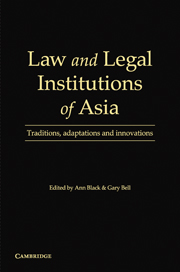9 - Brunei Darussalam
Ideology and law in a Malay sultanate
Published online by Cambridge University Press: 01 June 2011
Summary
Introduction
Although Brunei Darussalam (also named ‘Brunei, the Abode of Peace’) is one of the longest continuous monarchies in the world, it was only in 1984 that Brunei shed its colonial links with Great Britain to become a fully independent nation. It is only one of two nations which function as sultanates and is the smallest nation in Asia, with a population of around 400,000. It has a boundary length of less than 400 kilometres, with its total area 5769 square kilometres. Brunei is situated on the island of Borneo on the South China Sea side and is comprised of two small enclaves surrounded by the Malaysian states of Sabah and Sarawak. Sarawak owns the narrow portion of land, the Limbang, which separates the two parts of Brunei. The large Indonesian province of Kalimantan makes up the remaining portion of Borneo. As has been the pattern throughout the island, Brunei is an ethnically pluralistic society. Although social scientists and census takers have found the identification and classification of the varied Bornean ethnic groups difficult, the Government of Brunei has categorised the Brunei Malays and six ethnic groups (puak jati, or original tribes) – the Kedayan, Tutong, Belait, Dusun, Bisaya and Murut – as Malay for the purposes of nationality. The result is that census data shows that Brunei Malays comprise 68 per cent of the population, Chinese 15 per cent, other indigenous groups 6 per cent and other races 11 per cent.
- Type
- Chapter
- Information
- Law and Legal Institutions of AsiaTraditions, Adaptations and Innovations, pp. 299 - 329Publisher: Cambridge University PressPrint publication year: 2011
References
- 3
- Cited by



